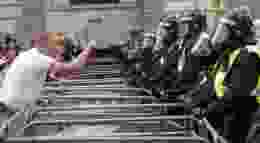
The government modelling is excluding real instances of harm
The government have grounded the country until further notice, and therefore need to be constantly held to account.
In the mid-thirties in Ohio, a stockbroker who had lost his money in the Crash met up with a proctologist (who as far as I know hadn't) to see if they could help each other with a mutual and life-threatening condition. Since that very informal, indeed random, inception in 1935 the Fellowship of Alcoholics Anonymous has saved, and spiritually reinvigorated, many millions of lives. Like all institutions it has also acquired its own idiom. Members of AA routinely refer to the rooms: the thousands of Meetings (I capitalise quite intentionally) worldwide in which is practised the strange alchemy of recovery.
The 12-Step programme of Alcoholics Anonymous emphasises action over reflection. We are not the Quakers. The programme can in fact be summed up as involving three specific activities: that we trust in a God (of our own understanding); that we clean house (by making a "searching and fearless moral inventory of ourselves); and that we help others (the alcoholic and the non-alcoholic alike). It's possible to undertake these things without being in the rooms in much the same way that it's possible to run a marathon without the possibility of rehydrating. You can try it, but you're more likely to die than not.
And now the government has removed the drinks stations. The rooms of AA are empty and locked.
Be of no doubt that the disease of alcoholism kills more people, and wrecks more lives, than the Coronavirus is likely to. And I use the word "disease" quite deliberately. There are those who argue as follows: that in calling alcoholism a "disease" we are giving the alcoholic a pass – that she is responsible for her condition and doesn't deserve to borrow from the language of victimhood. Alcoholism, they insist, in the end involves choice.
But this misses the point. The alcoholic does make choices, one of which involves an admission of powerlessness over alcohol and the decision to follow the battle-hardened rescue plan (that's a "life or death" choice). The AA programme is structured in terms of responsibility. If you do not accept that you are responsible for your past and current actions then you will relapse, simple as that. Responsibility is not dissolved in the programme, rather it shapes it and provides the parameters within which recovery becomes possible.
If we ask: what is the moral basis for the government's (supposedly temporary) confiscation of our liberties, then it must be this: utilitarianism. The Prime Minister has insisted that his aim is to minimise harm, where "harm" is defined in a purely empirical way. If, on this account, his strategy reduces the eventual death toll (and "saves" the NHS) then it will have been vindicated. QED. End of debate. Government policy is to treat each individual as a piece of data to be shoved into a government model, rather than a unique centre of value.
But in that case, why focus only on those deaths in which the virus plays a direct causal role? On what basis are those other deaths which are consequentially related to the government strategy, excluded from the overall calculus of mortality? We might call these cases the tangible but excluded consequences of the government approach.
There are deeper philosophical and ethical problems with what I will call, with only a little exaggeration, the martial law plan (MLP).
The philosopher Bernard Williams drew a distinction between thin and thick ethical concepts. Examples of the former would be "right", "wrong", "good", "bad". Examples of the latter would include "courageousness", "selfishness", "kindness". Williams argued that a moral theory which exploits only the thin concepts would be impoverished as it would have little to say about our moral psychology and its connection to action. A truly worthwhile moral system must make some reference to the thick concepts: try giving an account of the nature of "hypocrisy" for example, using only the thinner gruel.
Utilitarianism commits this error: it relies on a notion of "harm" which it does nothing to explicate. The Prime Minister's MLP inherits this error and doubles down by reducing all "harm" to empirically measurable harm and even then, as we have seen, it takes care to leave out the inconvenient instances.
The recovering alcoholic who is a member of AA would not make this mistake. For him the rooms are not just "safe spaces", drained of the possibility of "harm". They contain a certain magic that can only be described using the language of thick moral terms. We see courageousness, selflessness and the dangers of selfishness. And we see these things because, being participants in an active programme, we know that to stay sober we must put kindness into action. The recovering alcoholic knows that being alive is not the same as just living, because she knows that being sober is not the same as "not drinking". And he knows that to live "one day at a time" is not to put lines on a calendar, but to treat each day as an opportunity for giving, and therefore for an intensification and consolidation of his recovery.
The recovering alcoholic appreciates, if you like, that there are laws of spiritual physics which transcend considerations of mere utility. That the rooms are now closed due to MLP will generate real spiritual harms, in the sense of harms that are real because they are spiritual. We might call these the real, intangible and therefore overlooked cases.
I believe that the government's approach to this crisis is morally imperfect, but it doesn't follow that the alternatives aren't. I'm not offering criticism for the sake of it, and the decisions ministers are required to make are ones that I would probably try to duck. But they have grounded the country until further notice, and therefore need to be constantly held to account.
I would ask the recuperating Prime Minister this question. There are situations occurring now in which alcoholics need to meet with their sponsor, on pain of relapse. They are legally barred from doing so. The responsibility that the non-alcoholic insists they should exercise is therefore made unavailable. Will any consequent deaths be included in the government modelling? And if not, why not?





